Corporations Act: Climate Change, Director's Duty & Company Liability
VerifiedAdded on 2022/09/30
|13
|2866
|32
Case Study
AI Summary
This assignment analyzes the case of Exotic Ltd, a listed Australian company operating a resort facing climate change-related challenges. The directors, including the managing director Joel, a non-executive director Bill, and a local director Bibi, are grappling with increased algae presence due to climate change, impacting guest experiences and leading to increased treatment costs. The company's financial difficulties have resulted in overdue payments to the treatment provider and potential insolvency. The assignment explores the directors' duties under the Corporations Act 2001, particularly concerning their duty of care and diligence, and the requirement to consider foreseeable climate change risks. It examines the potential liability of the directors for failing to disclose financial risks in financial statements and for failing to mitigate the impacts of climate change. The analysis considers the application of relevant laws, including the Australian Securities Exchange (ASX) listing rules, and the implications of the directors' actions in relation to the company's solvency. The conclusion finds the directors liable for breaching their duties by failing to address climate change risks, disclose financial information, and foresee the damage to the business. The assignment also discusses the defenses available to directors and the implications of the company's insolvency, as well as the importance of directors staying informed about the company's affairs.
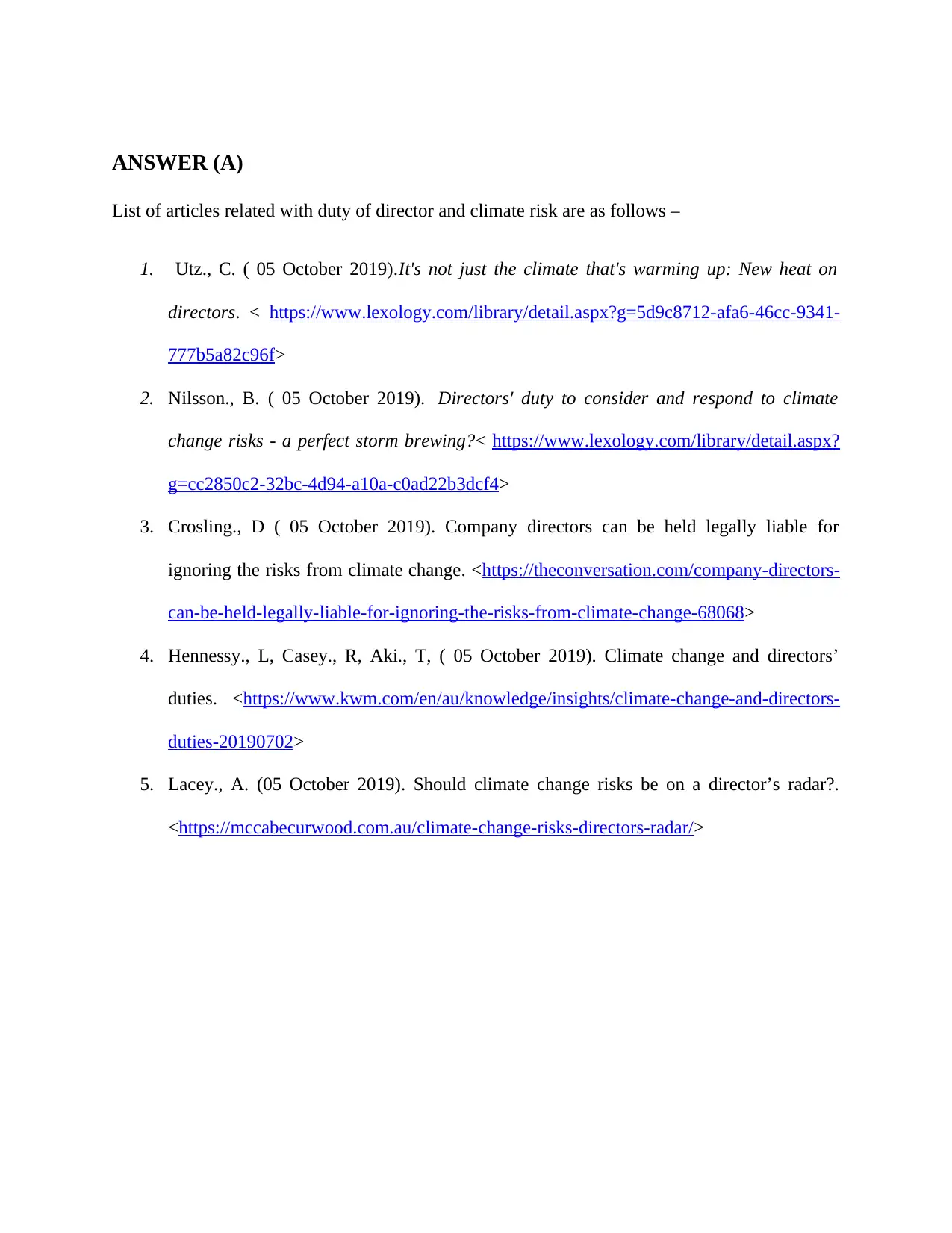
ANSWER (A)
List of articles related with duty of director and climate risk are as follows –
1. Utz., C. ( 05 October 2019).It's not just the climate that's warming up: New heat on
directors. < https://www.lexology.com/library/detail.aspx?g=5d9c8712-afa6-46cc-9341-
777b5a82c96f>
2. Nilsson., B. ( 05 October 2019). Directors' duty to consider and respond to climate
change risks - a perfect storm brewing?< https://www.lexology.com/library/detail.aspx?
g=cc2850c2-32bc-4d94-a10a-c0ad22b3dcf4>
3. Crosling., D ( 05 October 2019). Company directors can be held legally liable for
ignoring the risks from climate change. <https://theconversation.com/company-directors-
can-be-held-legally-liable-for-ignoring-the-risks-from-climate-change-68068>
4. Hennessy., L, Casey., R, Aki., T, ( 05 October 2019). Climate change and directors’
duties. <https://www.kwm.com/en/au/knowledge/insights/climate-change-and-directors-
duties-20190702>
5. Lacey., A. (05 October 2019). Should climate change risks be on a director’s radar?.
<https://mccabecurwood.com.au/climate-change-risks-directors-radar/>
List of articles related with duty of director and climate risk are as follows –
1. Utz., C. ( 05 October 2019).It's not just the climate that's warming up: New heat on
directors. < https://www.lexology.com/library/detail.aspx?g=5d9c8712-afa6-46cc-9341-
777b5a82c96f>
2. Nilsson., B. ( 05 October 2019). Directors' duty to consider and respond to climate
change risks - a perfect storm brewing?< https://www.lexology.com/library/detail.aspx?
g=cc2850c2-32bc-4d94-a10a-c0ad22b3dcf4>
3. Crosling., D ( 05 October 2019). Company directors can be held legally liable for
ignoring the risks from climate change. <https://theconversation.com/company-directors-
can-be-held-legally-liable-for-ignoring-the-risks-from-climate-change-68068>
4. Hennessy., L, Casey., R, Aki., T, ( 05 October 2019). Climate change and directors’
duties. <https://www.kwm.com/en/au/knowledge/insights/climate-change-and-directors-
duties-20190702>
5. Lacey., A. (05 October 2019). Should climate change risks be on a director’s radar?.
<https://mccabecurwood.com.au/climate-change-risks-directors-radar/>
Paraphrase This Document
Need a fresh take? Get an instant paraphrase of this document with our AI Paraphraser
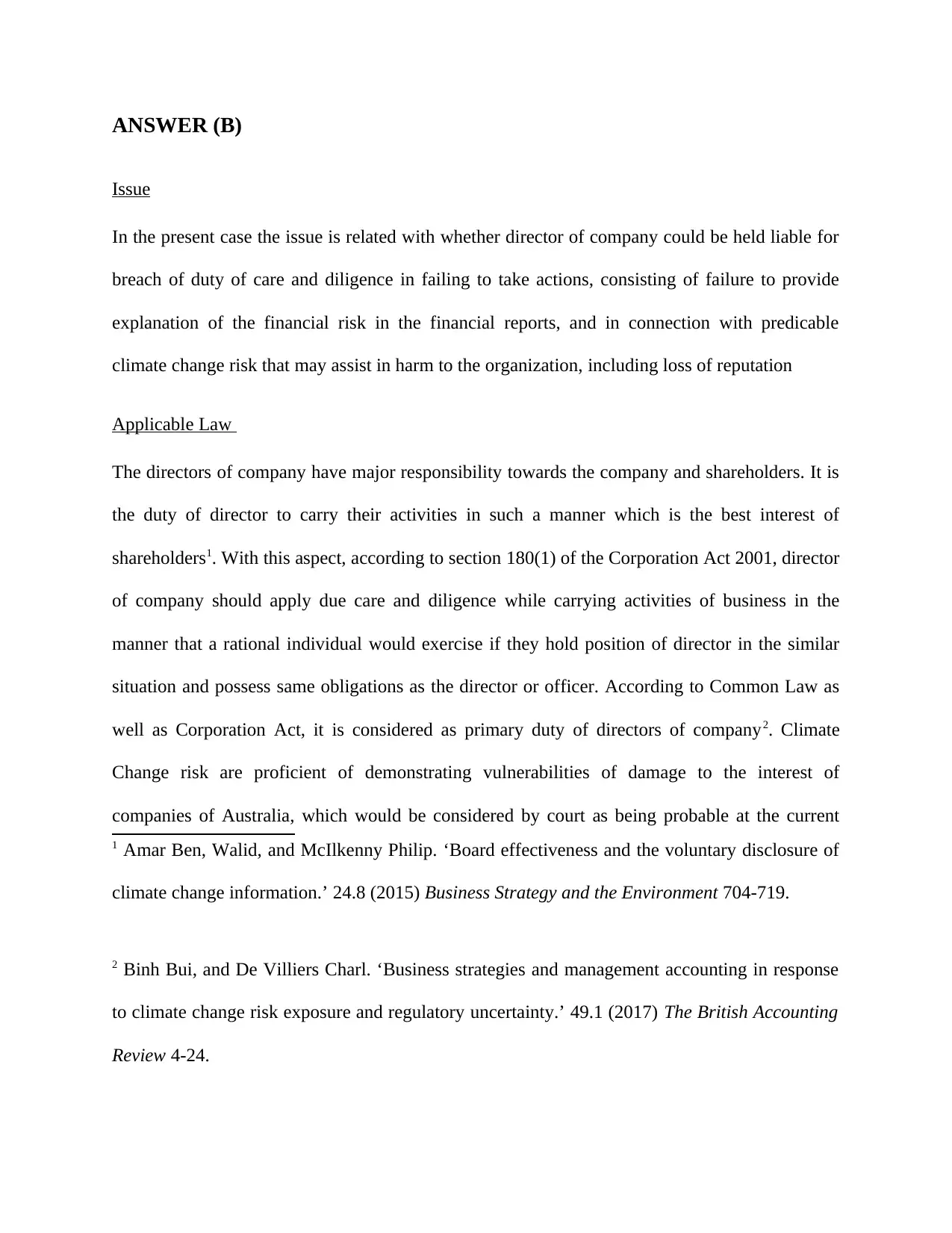
ANSWER (B)
Issue
In the present case the issue is related with whether director of company could be held liable for
breach of duty of care and diligence in failing to take actions, consisting of failure to provide
explanation of the financial risk in the financial reports, and in connection with predicable
climate change risk that may assist in harm to the organization, including loss of reputation
Applicable Law
The directors of company have major responsibility towards the company and shareholders. It is
the duty of director to carry their activities in such a manner which is the best interest of
shareholders1. With this aspect, according to section 180(1) of the Corporation Act 2001, director
of company should apply due care and diligence while carrying activities of business in the
manner that a rational individual would exercise if they hold position of director in the similar
situation and possess same obligations as the director or officer. According to Common Law as
well as Corporation Act, it is considered as primary duty of directors of company2. Climate
Change risk are proficient of demonstrating vulnerabilities of damage to the interest of
companies of Australia, which would be considered by court as being probable at the current
1 Amar Ben, Walid, and McIlkenny Philip. ‘Board effectiveness and the voluntary disclosure of
climate change information.’ 24.8 (2015) Business Strategy and the Environment 704-719.
2 Binh Bui, and De Villiers Charl. ‘Business strategies and management accounting in response
to climate change risk exposure and regulatory uncertainty.’ 49.1 (2017) The British Accounting
Review 4-24.
Issue
In the present case the issue is related with whether director of company could be held liable for
breach of duty of care and diligence in failing to take actions, consisting of failure to provide
explanation of the financial risk in the financial reports, and in connection with predicable
climate change risk that may assist in harm to the organization, including loss of reputation
Applicable Law
The directors of company have major responsibility towards the company and shareholders. It is
the duty of director to carry their activities in such a manner which is the best interest of
shareholders1. With this aspect, according to section 180(1) of the Corporation Act 2001, director
of company should apply due care and diligence while carrying activities of business in the
manner that a rational individual would exercise if they hold position of director in the similar
situation and possess same obligations as the director or officer. According to Common Law as
well as Corporation Act, it is considered as primary duty of directors of company2. Climate
Change risk are proficient of demonstrating vulnerabilities of damage to the interest of
companies of Australia, which would be considered by court as being probable at the current
1 Amar Ben, Walid, and McIlkenny Philip. ‘Board effectiveness and the voluntary disclosure of
climate change information.’ 24.8 (2015) Business Strategy and the Environment 704-719.
2 Binh Bui, and De Villiers Charl. ‘Business strategies and management accounting in response
to climate change risk exposure and regulatory uncertainty.’ 49.1 (2017) The British Accounting
Review 4-24.
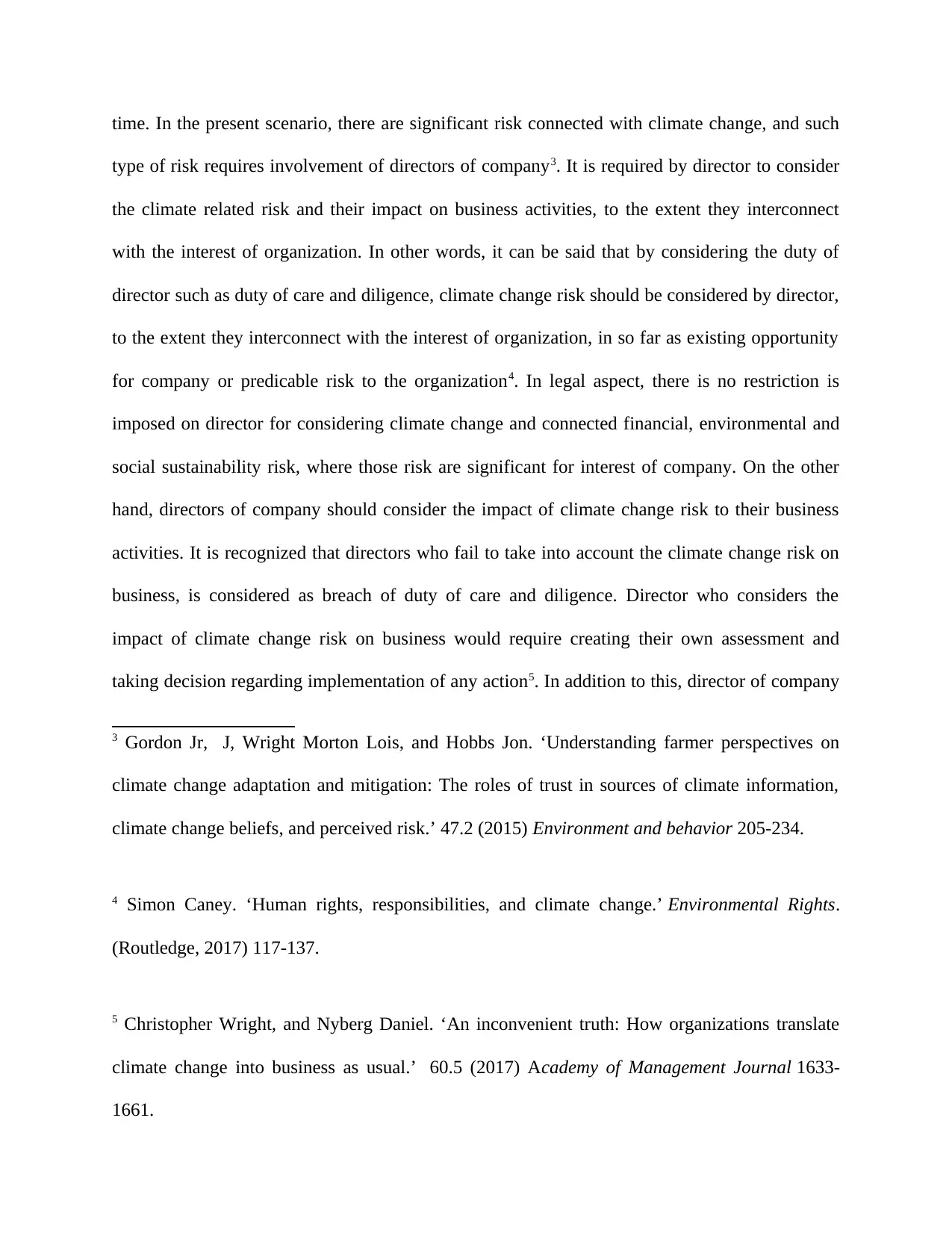
time. In the present scenario, there are significant risk connected with climate change, and such
type of risk requires involvement of directors of company3. It is required by director to consider
the climate related risk and their impact on business activities, to the extent they interconnect
with the interest of organization. In other words, it can be said that by considering the duty of
director such as duty of care and diligence, climate change risk should be considered by director,
to the extent they interconnect with the interest of organization, in so far as existing opportunity
for company or predicable risk to the organization4. In legal aspect, there is no restriction is
imposed on director for considering climate change and connected financial, environmental and
social sustainability risk, where those risk are significant for interest of company. On the other
hand, directors of company should consider the impact of climate change risk to their business
activities. It is recognized that directors who fail to take into account the climate change risk on
business, is considered as breach of duty of care and diligence. Director who considers the
impact of climate change risk on business would require creating their own assessment and
taking decision regarding implementation of any action5. In addition to this, director of company
3 Gordon Jr, J, Wright Morton Lois, and Hobbs Jon. ‘Understanding farmer perspectives on
climate change adaptation and mitigation: The roles of trust in sources of climate information,
climate change beliefs, and perceived risk.’ 47.2 (2015) Environment and behavior 205-234.
4 Simon Caney. ‘Human rights, responsibilities, and climate change.’ Environmental Rights.
(Routledge, 2017) 117-137.
5 Christopher Wright, and Nyberg Daniel. ‘An inconvenient truth: How organizations translate
climate change into business as usual.’ 60.5 (2017) Academy of Management Journal 1633-
1661.
type of risk requires involvement of directors of company3. It is required by director to consider
the climate related risk and their impact on business activities, to the extent they interconnect
with the interest of organization. In other words, it can be said that by considering the duty of
director such as duty of care and diligence, climate change risk should be considered by director,
to the extent they interconnect with the interest of organization, in so far as existing opportunity
for company or predicable risk to the organization4. In legal aspect, there is no restriction is
imposed on director for considering climate change and connected financial, environmental and
social sustainability risk, where those risk are significant for interest of company. On the other
hand, directors of company should consider the impact of climate change risk to their business
activities. It is recognized that directors who fail to take into account the climate change risk on
business, is considered as breach of duty of care and diligence. Director who considers the
impact of climate change risk on business would require creating their own assessment and
taking decision regarding implementation of any action5. In addition to this, director of company
3 Gordon Jr, J, Wright Morton Lois, and Hobbs Jon. ‘Understanding farmer perspectives on
climate change adaptation and mitigation: The roles of trust in sources of climate information,
climate change beliefs, and perceived risk.’ 47.2 (2015) Environment and behavior 205-234.
4 Simon Caney. ‘Human rights, responsibilities, and climate change.’ Environmental Rights.
(Routledge, 2017) 117-137.
5 Christopher Wright, and Nyberg Daniel. ‘An inconvenient truth: How organizations translate
climate change into business as usual.’ 60.5 (2017) Academy of Management Journal 1633-
1661.
⊘ This is a preview!⊘
Do you want full access?
Subscribe today to unlock all pages.

Trusted by 1+ million students worldwide
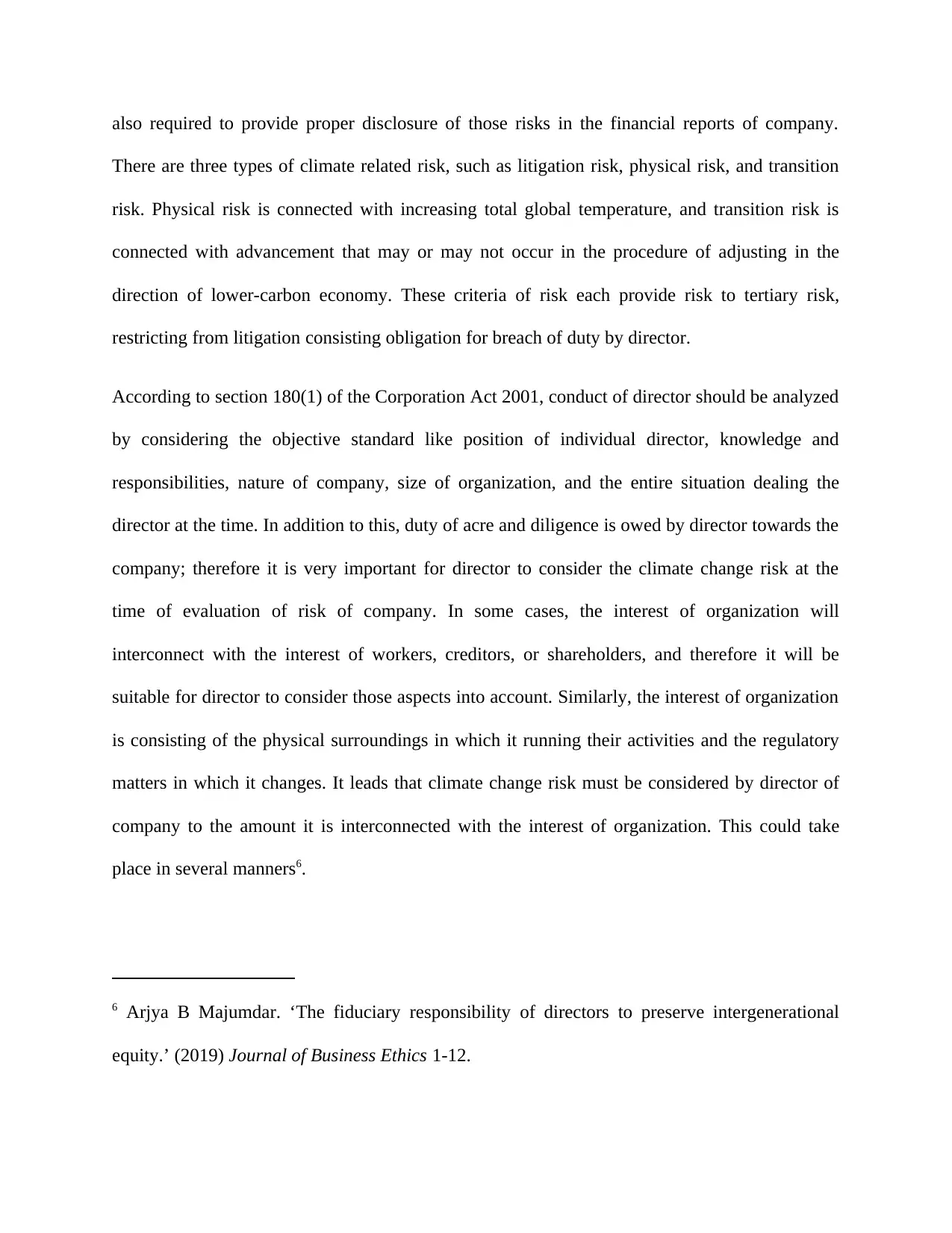
also required to provide proper disclosure of those risks in the financial reports of company.
There are three types of climate related risk, such as litigation risk, physical risk, and transition
risk. Physical risk is connected with increasing total global temperature, and transition risk is
connected with advancement that may or may not occur in the procedure of adjusting in the
direction of lower-carbon economy. These criteria of risk each provide risk to tertiary risk,
restricting from litigation consisting obligation for breach of duty by director.
According to section 180(1) of the Corporation Act 2001, conduct of director should be analyzed
by considering the objective standard like position of individual director, knowledge and
responsibilities, nature of company, size of organization, and the entire situation dealing the
director at the time. In addition to this, duty of acre and diligence is owed by director towards the
company; therefore it is very important for director to consider the climate change risk at the
time of evaluation of risk of company. In some cases, the interest of organization will
interconnect with the interest of workers, creditors, or shareholders, and therefore it will be
suitable for director to consider those aspects into account. Similarly, the interest of organization
is consisting of the physical surroundings in which it running their activities and the regulatory
matters in which it changes. It leads that climate change risk must be considered by director of
company to the amount it is interconnected with the interest of organization. This could take
place in several manners6.
6 Arjya B Majumdar. ‘The fiduciary responsibility of directors to preserve intergenerational
equity.’ (2019) Journal of Business Ethics 1-12.
There are three types of climate related risk, such as litigation risk, physical risk, and transition
risk. Physical risk is connected with increasing total global temperature, and transition risk is
connected with advancement that may or may not occur in the procedure of adjusting in the
direction of lower-carbon economy. These criteria of risk each provide risk to tertiary risk,
restricting from litigation consisting obligation for breach of duty by director.
According to section 180(1) of the Corporation Act 2001, conduct of director should be analyzed
by considering the objective standard like position of individual director, knowledge and
responsibilities, nature of company, size of organization, and the entire situation dealing the
director at the time. In addition to this, duty of acre and diligence is owed by director towards the
company; therefore it is very important for director to consider the climate change risk at the
time of evaluation of risk of company. In some cases, the interest of organization will
interconnect with the interest of workers, creditors, or shareholders, and therefore it will be
suitable for director to consider those aspects into account. Similarly, the interest of organization
is consisting of the physical surroundings in which it running their activities and the regulatory
matters in which it changes. It leads that climate change risk must be considered by director of
company to the amount it is interconnected with the interest of organization. This could take
place in several manners6.
6 Arjya B Majumdar. ‘The fiduciary responsibility of directors to preserve intergenerational
equity.’ (2019) Journal of Business Ethics 1-12.
Paraphrase This Document
Need a fresh take? Get an instant paraphrase of this document with our AI Paraphraser
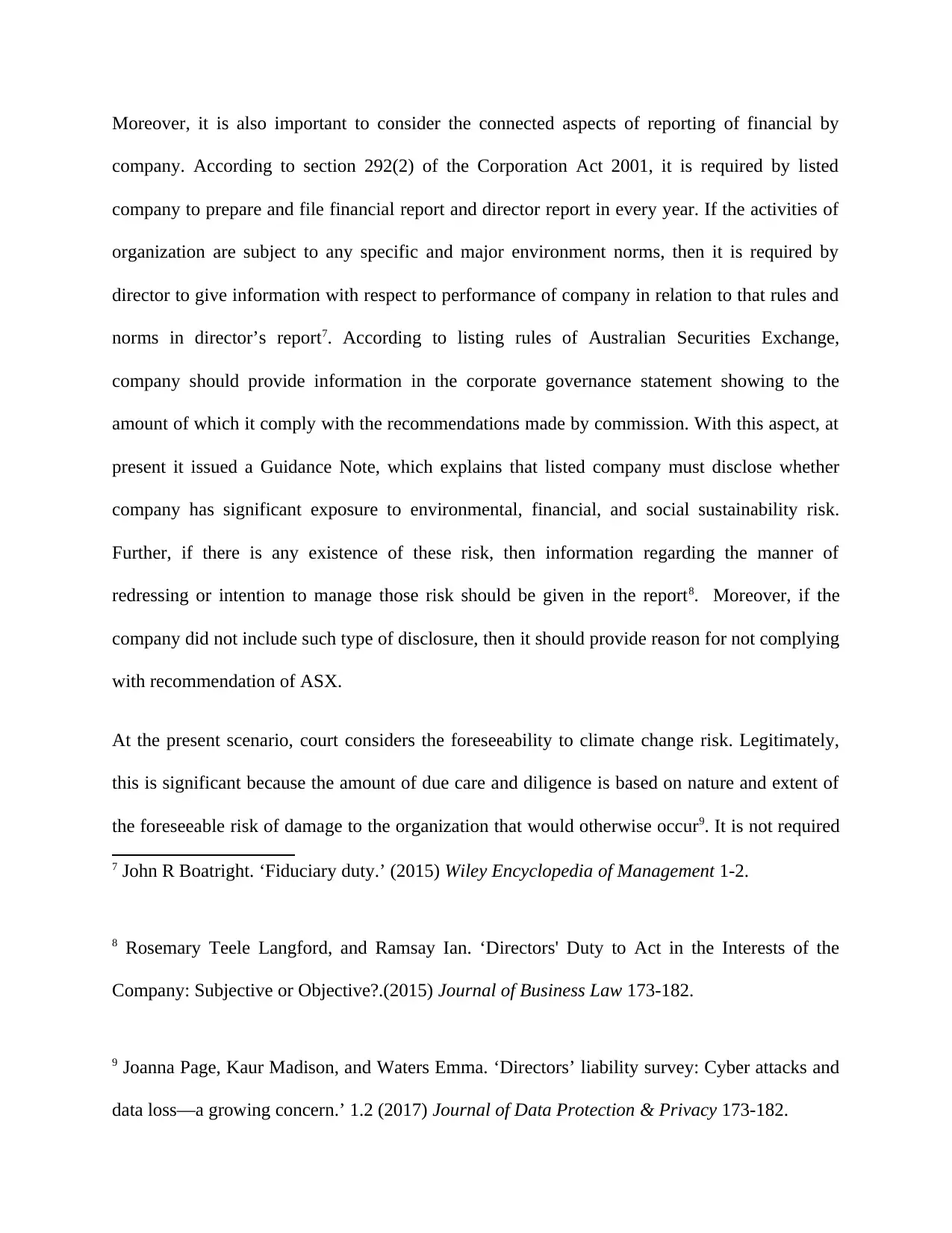
Moreover, it is also important to consider the connected aspects of reporting of financial by
company. According to section 292(2) of the Corporation Act 2001, it is required by listed
company to prepare and file financial report and director report in every year. If the activities of
organization are subject to any specific and major environment norms, then it is required by
director to give information with respect to performance of company in relation to that rules and
norms in director’s report7. According to listing rules of Australian Securities Exchange,
company should provide information in the corporate governance statement showing to the
amount of which it comply with the recommendations made by commission. With this aspect, at
present it issued a Guidance Note, which explains that listed company must disclose whether
company has significant exposure to environmental, financial, and social sustainability risk.
Further, if there is any existence of these risk, then information regarding the manner of
redressing or intention to manage those risk should be given in the report8. Moreover, if the
company did not include such type of disclosure, then it should provide reason for not complying
with recommendation of ASX.
At the present scenario, court considers the foreseeability to climate change risk. Legitimately,
this is significant because the amount of due care and diligence is based on nature and extent of
the foreseeable risk of damage to the organization that would otherwise occur9. It is not required
7 John R Boatright. ‘Fiduciary duty.’ (2015) Wiley Encyclopedia of Management 1-2.
8 Rosemary Teele Langford, and Ramsay Ian. ‘Directors' Duty to Act in the Interests of the
Company: Subjective or Objective?.(2015) Journal of Business Law 173-182.
9 Joanna Page, Kaur Madison, and Waters Emma. ‘Directors’ liability survey: Cyber attacks and
data loss—a growing concern.’ 1.2 (2017) Journal of Data Protection & Privacy 173-182.
company. According to section 292(2) of the Corporation Act 2001, it is required by listed
company to prepare and file financial report and director report in every year. If the activities of
organization are subject to any specific and major environment norms, then it is required by
director to give information with respect to performance of company in relation to that rules and
norms in director’s report7. According to listing rules of Australian Securities Exchange,
company should provide information in the corporate governance statement showing to the
amount of which it comply with the recommendations made by commission. With this aspect, at
present it issued a Guidance Note, which explains that listed company must disclose whether
company has significant exposure to environmental, financial, and social sustainability risk.
Further, if there is any existence of these risk, then information regarding the manner of
redressing or intention to manage those risk should be given in the report8. Moreover, if the
company did not include such type of disclosure, then it should provide reason for not complying
with recommendation of ASX.
At the present scenario, court considers the foreseeability to climate change risk. Legitimately,
this is significant because the amount of due care and diligence is based on nature and extent of
the foreseeable risk of damage to the organization that would otherwise occur9. It is not required
7 John R Boatright. ‘Fiduciary duty.’ (2015) Wiley Encyclopedia of Management 1-2.
8 Rosemary Teele Langford, and Ramsay Ian. ‘Directors' Duty to Act in the Interests of the
Company: Subjective or Objective?.(2015) Journal of Business Law 173-182.
9 Joanna Page, Kaur Madison, and Waters Emma. ‘Directors’ liability survey: Cyber attacks and
data loss—a growing concern.’ 1.2 (2017) Journal of Data Protection & Privacy 173-182.
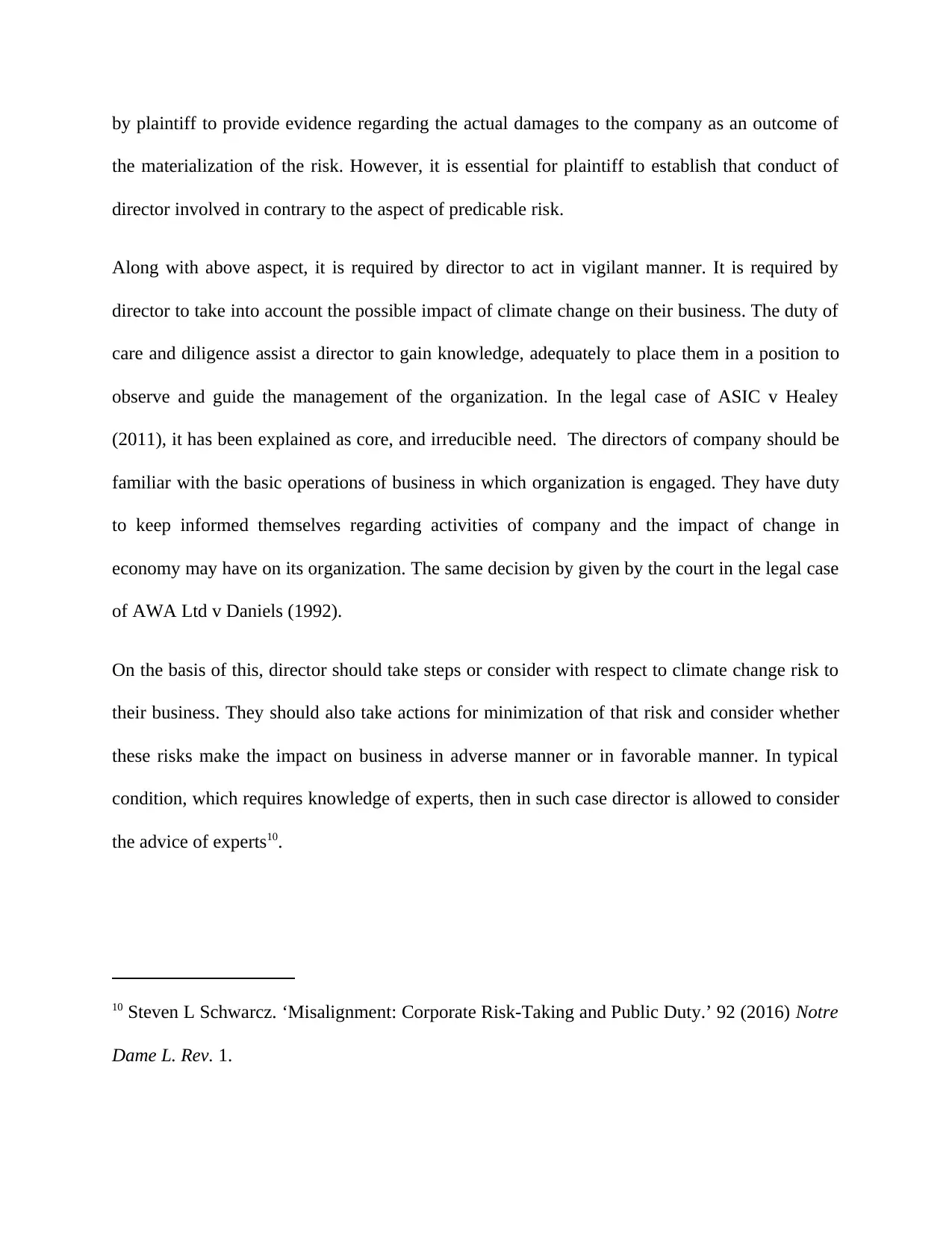
by plaintiff to provide evidence regarding the actual damages to the company as an outcome of
the materialization of the risk. However, it is essential for plaintiff to establish that conduct of
director involved in contrary to the aspect of predicable risk.
Along with above aspect, it is required by director to act in vigilant manner. It is required by
director to take into account the possible impact of climate change on their business. The duty of
care and diligence assist a director to gain knowledge, adequately to place them in a position to
observe and guide the management of the organization. In the legal case of ASIC v Healey
(2011), it has been explained as core, and irreducible need. The directors of company should be
familiar with the basic operations of business in which organization is engaged. They have duty
to keep informed themselves regarding activities of company and the impact of change in
economy may have on its organization. The same decision by given by the court in the legal case
of AWA Ltd v Daniels (1992).
On the basis of this, director should take steps or consider with respect to climate change risk to
their business. They should also take actions for minimization of that risk and consider whether
these risks make the impact on business in adverse manner or in favorable manner. In typical
condition, which requires knowledge of experts, then in such case director is allowed to consider
the advice of experts10.
10 Steven L Schwarcz. ‘Misalignment: Corporate Risk-Taking and Public Duty.’ 92 (2016) Notre
Dame L. Rev. 1.
the materialization of the risk. However, it is essential for plaintiff to establish that conduct of
director involved in contrary to the aspect of predicable risk.
Along with above aspect, it is required by director to act in vigilant manner. It is required by
director to take into account the possible impact of climate change on their business. The duty of
care and diligence assist a director to gain knowledge, adequately to place them in a position to
observe and guide the management of the organization. In the legal case of ASIC v Healey
(2011), it has been explained as core, and irreducible need. The directors of company should be
familiar with the basic operations of business in which organization is engaged. They have duty
to keep informed themselves regarding activities of company and the impact of change in
economy may have on its organization. The same decision by given by the court in the legal case
of AWA Ltd v Daniels (1992).
On the basis of this, director should take steps or consider with respect to climate change risk to
their business. They should also take actions for minimization of that risk and consider whether
these risks make the impact on business in adverse manner or in favorable manner. In typical
condition, which requires knowledge of experts, then in such case director is allowed to consider
the advice of experts10.
10 Steven L Schwarcz. ‘Misalignment: Corporate Risk-Taking and Public Duty.’ 92 (2016) Notre
Dame L. Rev. 1.
⊘ This is a preview!⊘
Do you want full access?
Subscribe today to unlock all pages.

Trusted by 1+ million students worldwide
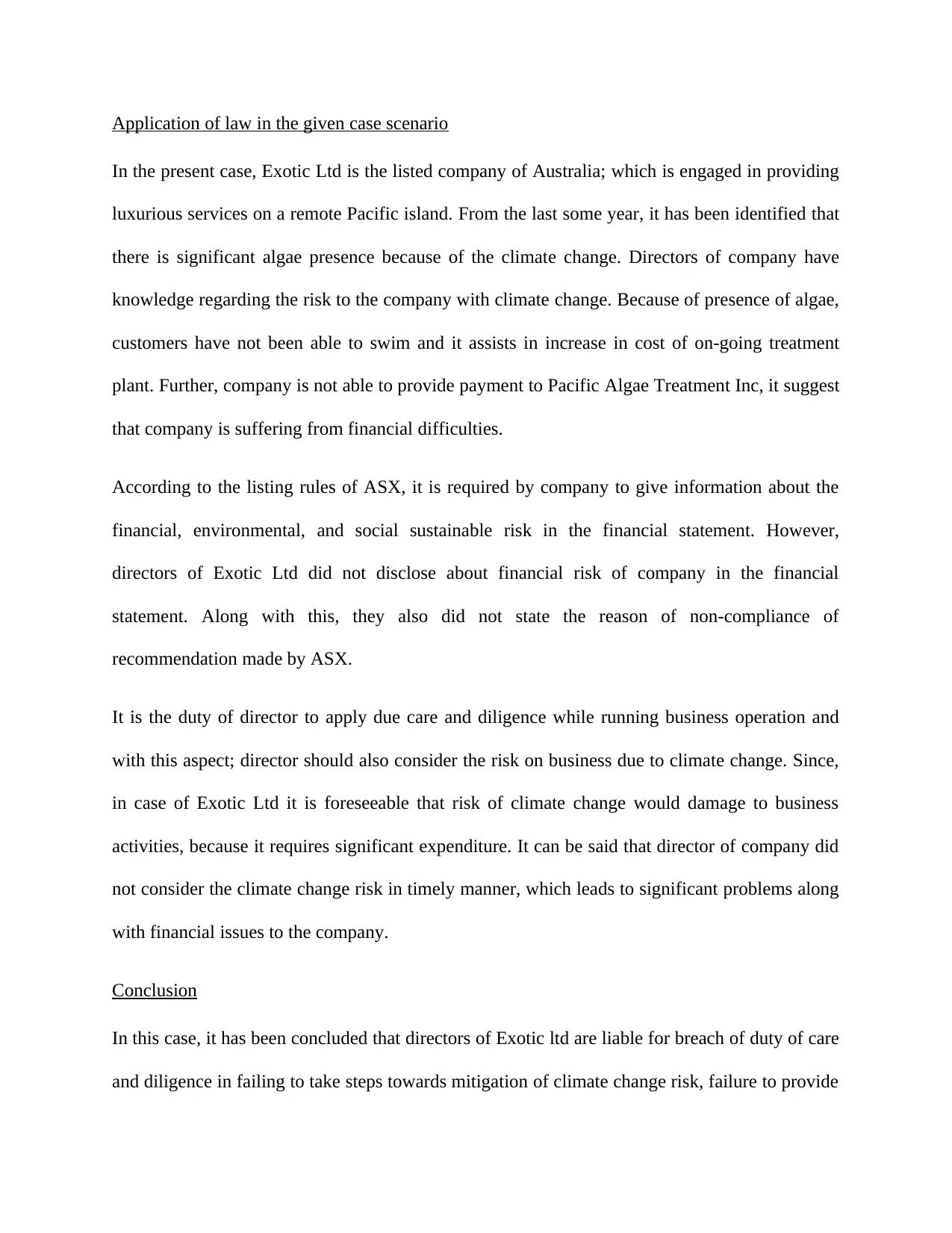
Application of law in the given case scenario
In the present case, Exotic Ltd is the listed company of Australia; which is engaged in providing
luxurious services on a remote Pacific island. From the last some year, it has been identified that
there is significant algae presence because of the climate change. Directors of company have
knowledge regarding the risk to the company with climate change. Because of presence of algae,
customers have not been able to swim and it assists in increase in cost of on-going treatment
plant. Further, company is not able to provide payment to Pacific Algae Treatment Inc, it suggest
that company is suffering from financial difficulties.
According to the listing rules of ASX, it is required by company to give information about the
financial, environmental, and social sustainable risk in the financial statement. However,
directors of Exotic Ltd did not disclose about financial risk of company in the financial
statement. Along with this, they also did not state the reason of non-compliance of
recommendation made by ASX.
It is the duty of director to apply due care and diligence while running business operation and
with this aspect; director should also consider the risk on business due to climate change. Since,
in case of Exotic Ltd it is foreseeable that risk of climate change would damage to business
activities, because it requires significant expenditure. It can be said that director of company did
not consider the climate change risk in timely manner, which leads to significant problems along
with financial issues to the company.
Conclusion
In this case, it has been concluded that directors of Exotic ltd are liable for breach of duty of care
and diligence in failing to take steps towards mitigation of climate change risk, failure to provide
In the present case, Exotic Ltd is the listed company of Australia; which is engaged in providing
luxurious services on a remote Pacific island. From the last some year, it has been identified that
there is significant algae presence because of the climate change. Directors of company have
knowledge regarding the risk to the company with climate change. Because of presence of algae,
customers have not been able to swim and it assists in increase in cost of on-going treatment
plant. Further, company is not able to provide payment to Pacific Algae Treatment Inc, it suggest
that company is suffering from financial difficulties.
According to the listing rules of ASX, it is required by company to give information about the
financial, environmental, and social sustainable risk in the financial statement. However,
directors of Exotic Ltd did not disclose about financial risk of company in the financial
statement. Along with this, they also did not state the reason of non-compliance of
recommendation made by ASX.
It is the duty of director to apply due care and diligence while running business operation and
with this aspect; director should also consider the risk on business due to climate change. Since,
in case of Exotic Ltd it is foreseeable that risk of climate change would damage to business
activities, because it requires significant expenditure. It can be said that director of company did
not consider the climate change risk in timely manner, which leads to significant problems along
with financial issues to the company.
Conclusion
In this case, it has been concluded that directors of Exotic ltd are liable for breach of duty of care
and diligence in failing to take steps towards mitigation of climate change risk, failure to provide
Paraphrase This Document
Need a fresh take? Get an instant paraphrase of this document with our AI Paraphraser
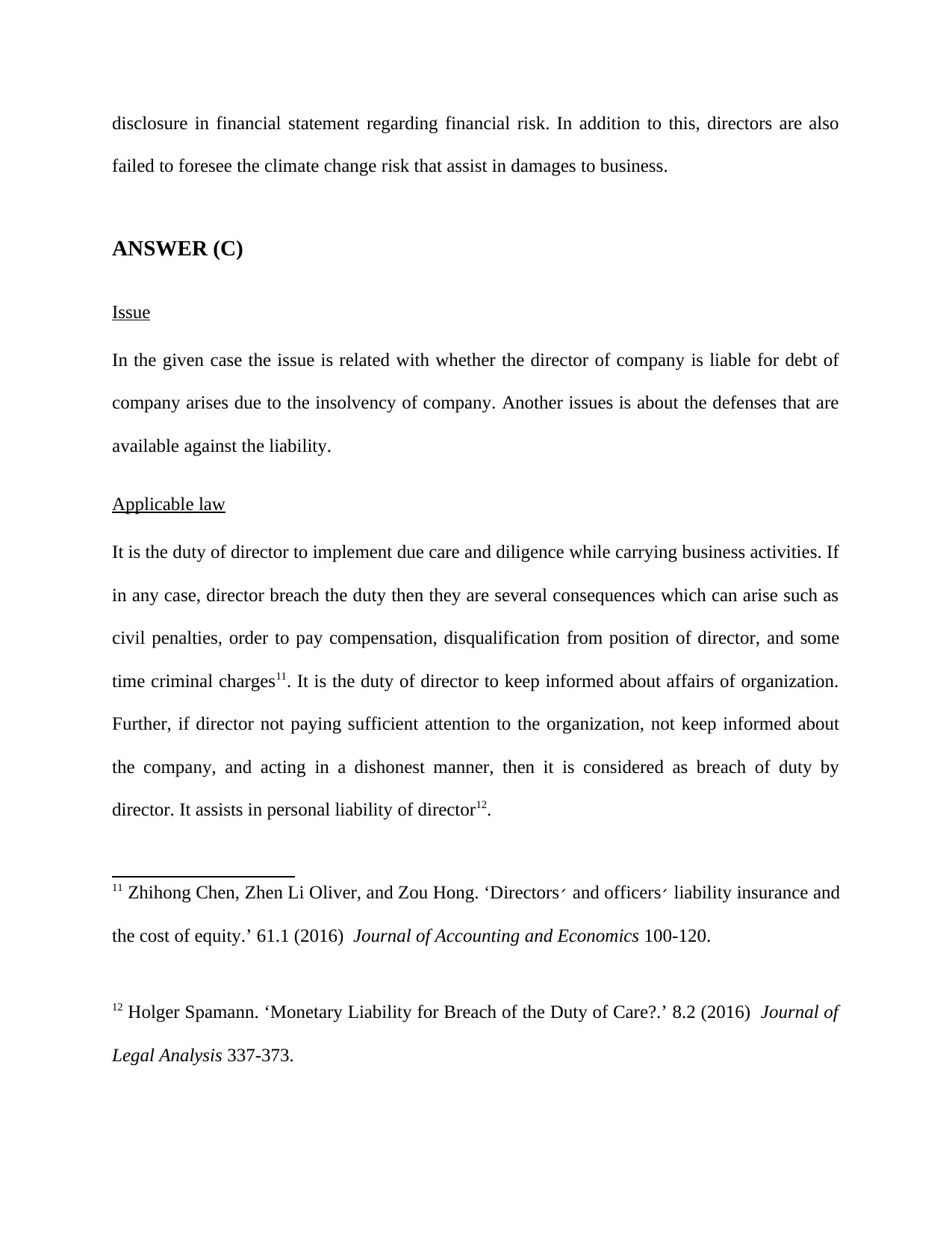
disclosure in financial statement regarding financial risk. In addition to this, directors are also
failed to foresee the climate change risk that assist in damages to business.
ANSWER (C)
Issue
In the given case the issue is related with whether the director of company is liable for debt of
company arises due to the insolvency of company. Another issues is about the defenses that are
available against the liability.
Applicable law
It is the duty of director to implement due care and diligence while carrying business activities. If
in any case, director breach the duty then they are several consequences which can arise such as
civil penalties, order to pay compensation, disqualification from position of director, and some
time criminal charges11. It is the duty of director to keep informed about affairs of organization.
Further, if director not paying sufficient attention to the organization, not keep informed about
the company, and acting in a dishonest manner, then it is considered as breach of duty by
director. It assists in personal liability of director12.
11 Zhihong Chen, Zhen Li Oliver, and Zou Hong. ‘Directors׳ and officers׳ liability insurance and
the cost of equity.’ 61.1 (2016) Journal of Accounting and Economics 100-120.
12 Holger Spamann. ‘Monetary Liability for Breach of the Duty of Care?.’ 8.2 (2016) Journal of
Legal Analysis 337-373.
failed to foresee the climate change risk that assist in damages to business.
ANSWER (C)
Issue
In the given case the issue is related with whether the director of company is liable for debt of
company arises due to the insolvency of company. Another issues is about the defenses that are
available against the liability.
Applicable law
It is the duty of director to implement due care and diligence while carrying business activities. If
in any case, director breach the duty then they are several consequences which can arise such as
civil penalties, order to pay compensation, disqualification from position of director, and some
time criminal charges11. It is the duty of director to keep informed about affairs of organization.
Further, if director not paying sufficient attention to the organization, not keep informed about
the company, and acting in a dishonest manner, then it is considered as breach of duty by
director. It assists in personal liability of director12.
11 Zhihong Chen, Zhen Li Oliver, and Zou Hong. ‘Directors׳ and officers׳ liability insurance and
the cost of equity.’ 61.1 (2016) Journal of Accounting and Economics 100-120.
12 Holger Spamann. ‘Monetary Liability for Breach of the Duty of Care?.’ 8.2 (2016) Journal of
Legal Analysis 337-373.
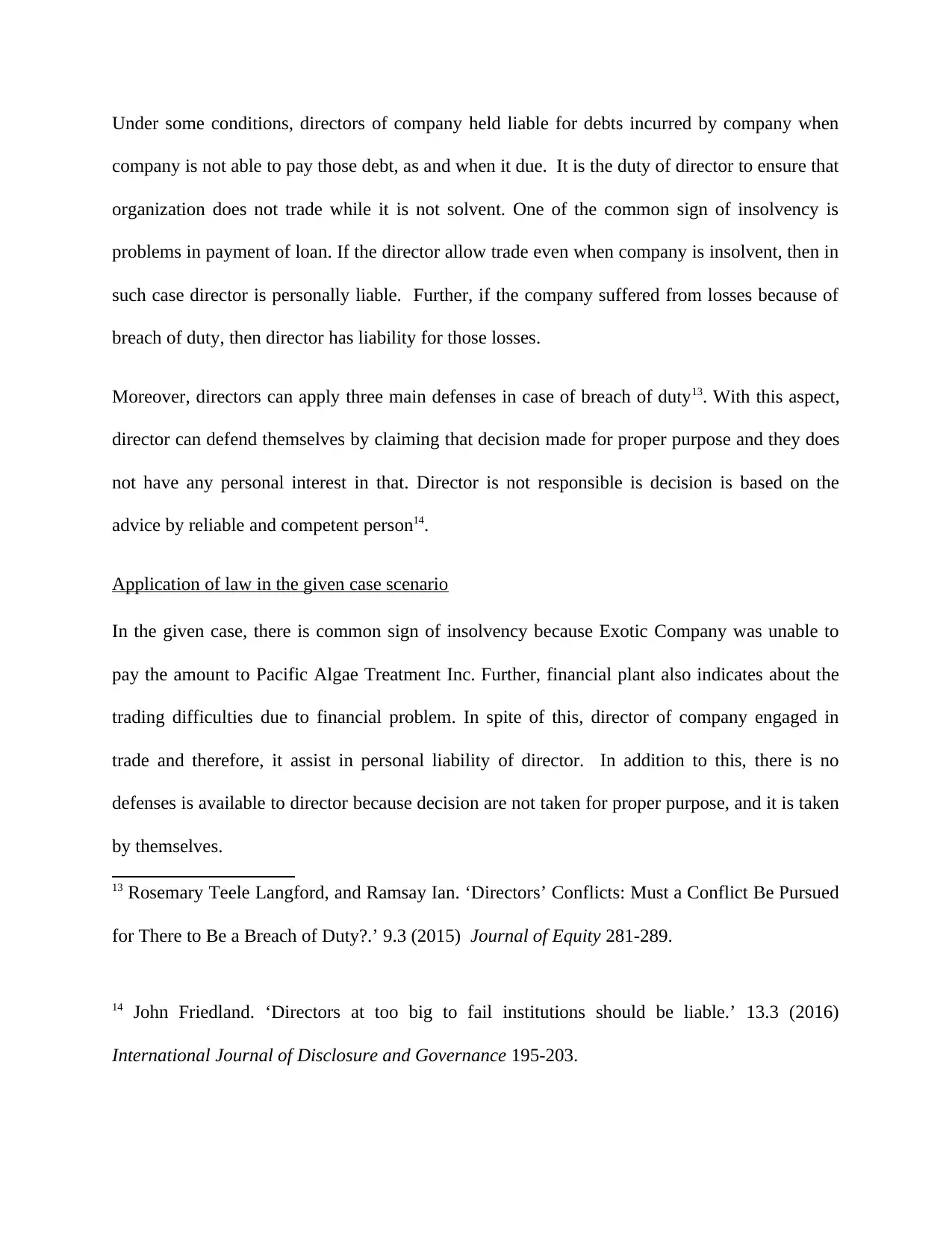
Under some conditions, directors of company held liable for debts incurred by company when
company is not able to pay those debt, as and when it due. It is the duty of director to ensure that
organization does not trade while it is not solvent. One of the common sign of insolvency is
problems in payment of loan. If the director allow trade even when company is insolvent, then in
such case director is personally liable. Further, if the company suffered from losses because of
breach of duty, then director has liability for those losses.
Moreover, directors can apply three main defenses in case of breach of duty13. With this aspect,
director can defend themselves by claiming that decision made for proper purpose and they does
not have any personal interest in that. Director is not responsible is decision is based on the
advice by reliable and competent person14.
Application of law in the given case scenario
In the given case, there is common sign of insolvency because Exotic Company was unable to
pay the amount to Pacific Algae Treatment Inc. Further, financial plant also indicates about the
trading difficulties due to financial problem. In spite of this, director of company engaged in
trade and therefore, it assist in personal liability of director. In addition to this, there is no
defenses is available to director because decision are not taken for proper purpose, and it is taken
by themselves.
13 Rosemary Teele Langford, and Ramsay Ian. ‘Directors’ Conflicts: Must a Conflict Be Pursued
for There to Be a Breach of Duty?.’ 9.3 (2015) Journal of Equity 281-289.
14 John Friedland. ‘Directors at too big to fail institutions should be liable.’ 13.3 (2016)
International Journal of Disclosure and Governance 195-203.
company is not able to pay those debt, as and when it due. It is the duty of director to ensure that
organization does not trade while it is not solvent. One of the common sign of insolvency is
problems in payment of loan. If the director allow trade even when company is insolvent, then in
such case director is personally liable. Further, if the company suffered from losses because of
breach of duty, then director has liability for those losses.
Moreover, directors can apply three main defenses in case of breach of duty13. With this aspect,
director can defend themselves by claiming that decision made for proper purpose and they does
not have any personal interest in that. Director is not responsible is decision is based on the
advice by reliable and competent person14.
Application of law in the given case scenario
In the given case, there is common sign of insolvency because Exotic Company was unable to
pay the amount to Pacific Algae Treatment Inc. Further, financial plant also indicates about the
trading difficulties due to financial problem. In spite of this, director of company engaged in
trade and therefore, it assist in personal liability of director. In addition to this, there is no
defenses is available to director because decision are not taken for proper purpose, and it is taken
by themselves.
13 Rosemary Teele Langford, and Ramsay Ian. ‘Directors’ Conflicts: Must a Conflict Be Pursued
for There to Be a Breach of Duty?.’ 9.3 (2015) Journal of Equity 281-289.
14 John Friedland. ‘Directors at too big to fail institutions should be liable.’ 13.3 (2016)
International Journal of Disclosure and Governance 195-203.
⊘ This is a preview!⊘
Do you want full access?
Subscribe today to unlock all pages.

Trusted by 1+ million students worldwide
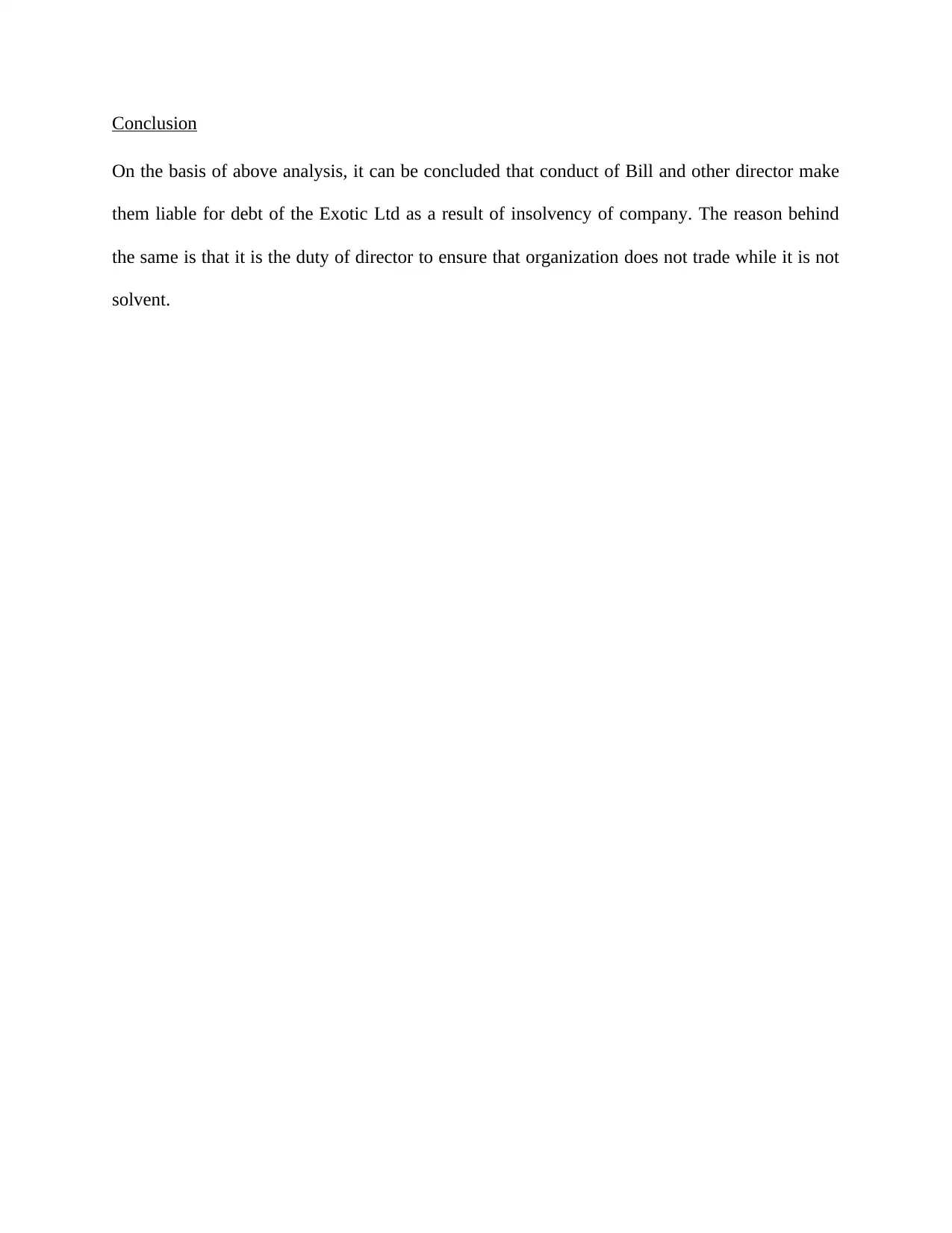
Conclusion
On the basis of above analysis, it can be concluded that conduct of Bill and other director make
them liable for debt of the Exotic Ltd as a result of insolvency of company. The reason behind
the same is that it is the duty of director to ensure that organization does not trade while it is not
solvent.
On the basis of above analysis, it can be concluded that conduct of Bill and other director make
them liable for debt of the Exotic Ltd as a result of insolvency of company. The reason behind
the same is that it is the duty of director to ensure that organization does not trade while it is not
solvent.
Paraphrase This Document
Need a fresh take? Get an instant paraphrase of this document with our AI Paraphraser
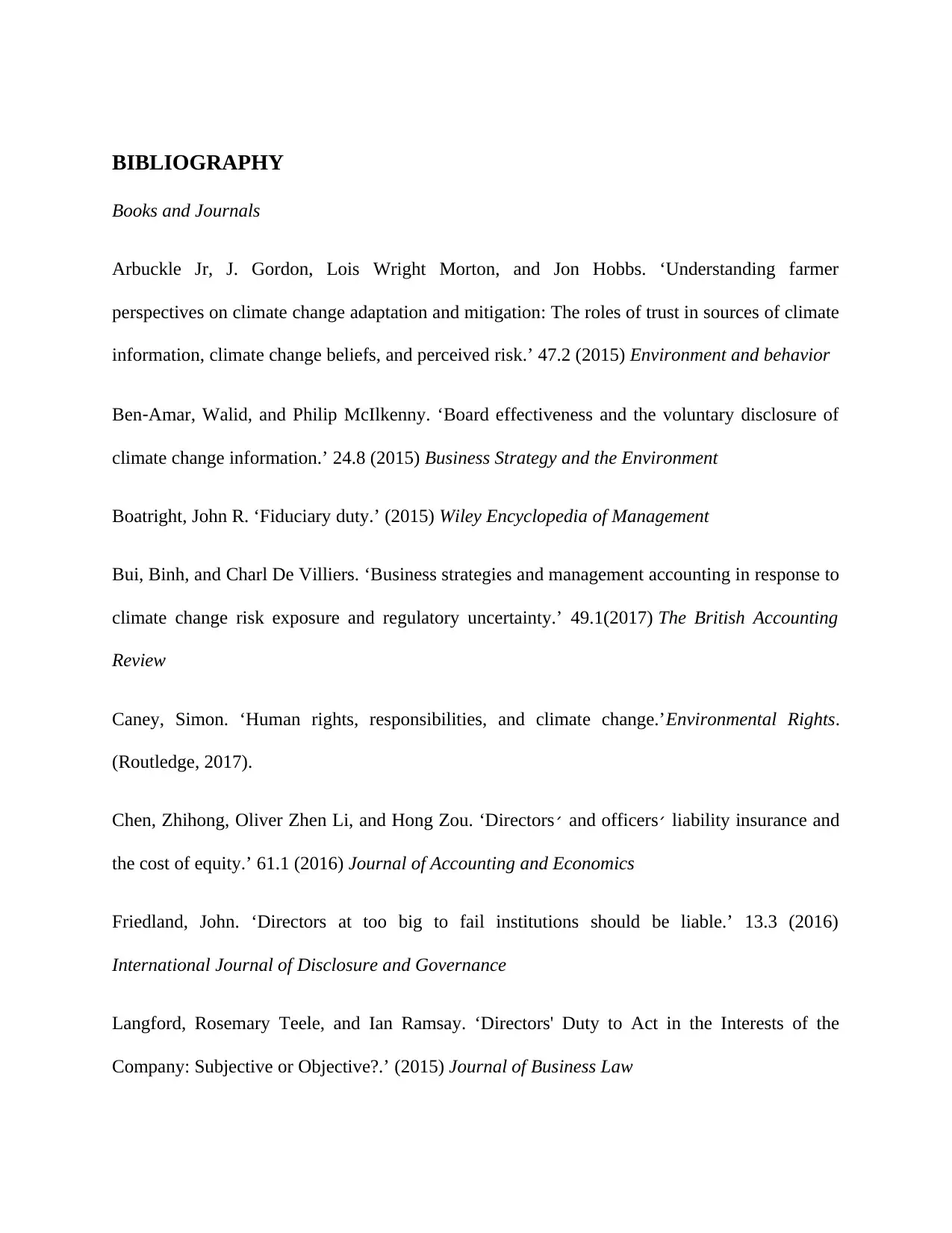
BIBLIOGRAPHY
Books and Journals
Arbuckle Jr, J. Gordon, Lois Wright Morton, and Jon Hobbs. ‘Understanding farmer
perspectives on climate change adaptation and mitigation: The roles of trust in sources of climate
information, climate change beliefs, and perceived risk.’ 47.2 (2015) Environment and behavior
Ben‐Amar, Walid, and Philip McIlkenny. ‘Board effectiveness and the voluntary disclosure of
climate change information.’ 24.8 (2015) Business Strategy and the Environment
Boatright, John R. ‘Fiduciary duty.’ (2015) Wiley Encyclopedia of Management
Bui, Binh, and Charl De Villiers. ‘Business strategies and management accounting in response to
climate change risk exposure and regulatory uncertainty.’ 49.1(2017) The British Accounting
Review
Caney, Simon. ‘Human rights, responsibilities, and climate change.’Environmental Rights.
(Routledge, 2017).
Chen, Zhihong, Oliver Zhen Li, and Hong Zou. ‘Directors׳ and officers׳ liability insurance and
the cost of equity.’ 61.1 (2016) Journal of Accounting and Economics
Friedland, John. ‘Directors at too big to fail institutions should be liable.’ 13.3 (2016)
International Journal of Disclosure and Governance
Langford, Rosemary Teele, and Ian Ramsay. ‘Directors' Duty to Act in the Interests of the
Company: Subjective or Objective?.’ (2015) Journal of Business Law
Books and Journals
Arbuckle Jr, J. Gordon, Lois Wright Morton, and Jon Hobbs. ‘Understanding farmer
perspectives on climate change adaptation and mitigation: The roles of trust in sources of climate
information, climate change beliefs, and perceived risk.’ 47.2 (2015) Environment and behavior
Ben‐Amar, Walid, and Philip McIlkenny. ‘Board effectiveness and the voluntary disclosure of
climate change information.’ 24.8 (2015) Business Strategy and the Environment
Boatright, John R. ‘Fiduciary duty.’ (2015) Wiley Encyclopedia of Management
Bui, Binh, and Charl De Villiers. ‘Business strategies and management accounting in response to
climate change risk exposure and regulatory uncertainty.’ 49.1(2017) The British Accounting
Review
Caney, Simon. ‘Human rights, responsibilities, and climate change.’Environmental Rights.
(Routledge, 2017).
Chen, Zhihong, Oliver Zhen Li, and Hong Zou. ‘Directors׳ and officers׳ liability insurance and
the cost of equity.’ 61.1 (2016) Journal of Accounting and Economics
Friedland, John. ‘Directors at too big to fail institutions should be liable.’ 13.3 (2016)
International Journal of Disclosure and Governance
Langford, Rosemary Teele, and Ian Ramsay. ‘Directors' Duty to Act in the Interests of the
Company: Subjective or Objective?.’ (2015) Journal of Business Law
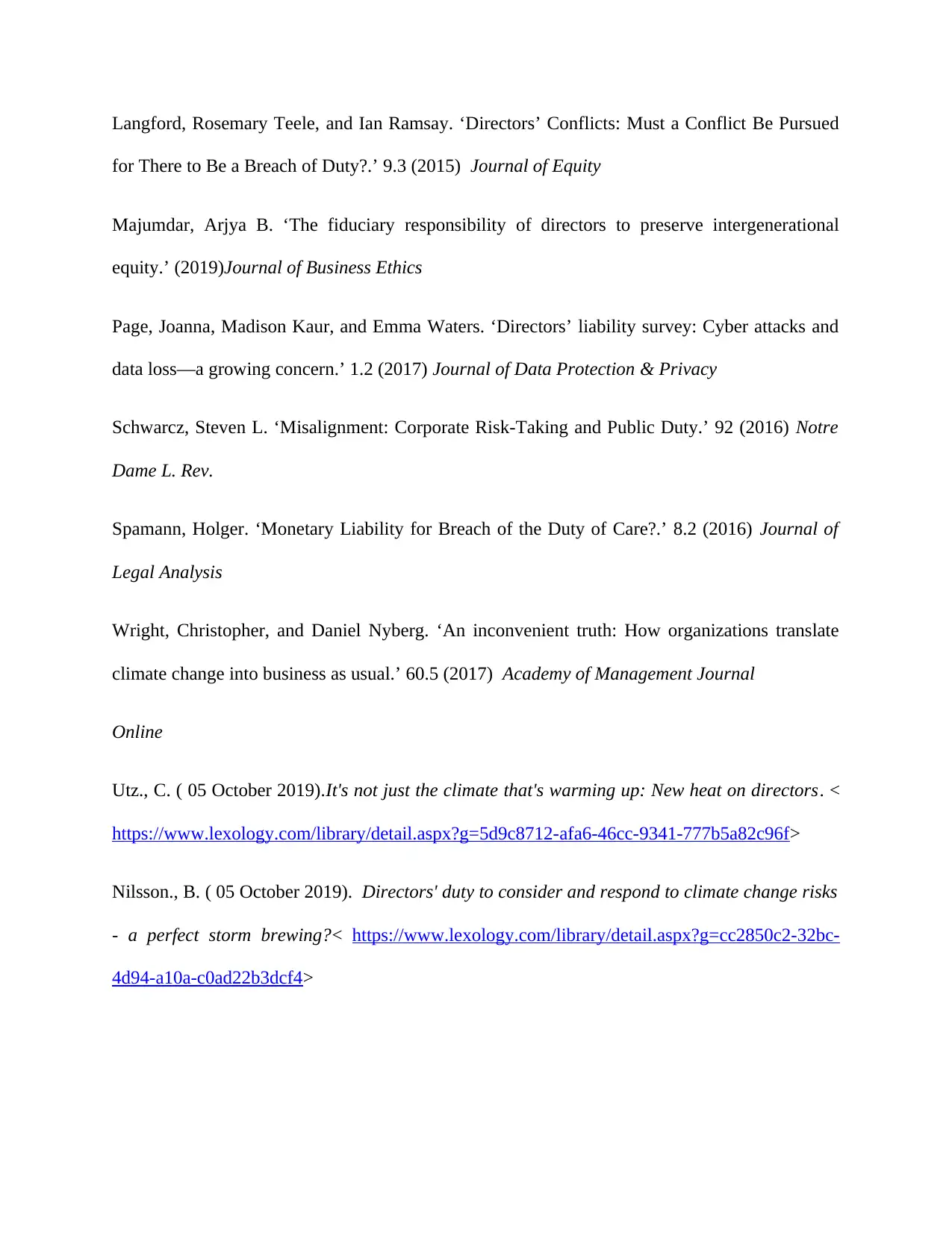
Langford, Rosemary Teele, and Ian Ramsay. ‘Directors’ Conflicts: Must a Conflict Be Pursued
for There to Be a Breach of Duty?.’ 9.3 (2015) Journal of Equity
Majumdar, Arjya B. ‘The fiduciary responsibility of directors to preserve intergenerational
equity.’ (2019)Journal of Business Ethics
Page, Joanna, Madison Kaur, and Emma Waters. ‘Directors’ liability survey: Cyber attacks and
data loss—a growing concern.’ 1.2 (2017) Journal of Data Protection & Privacy
Schwarcz, Steven L. ‘Misalignment: Corporate Risk-Taking and Public Duty.’ 92 (2016) Notre
Dame L. Rev.
Spamann, Holger. ‘Monetary Liability for Breach of the Duty of Care?.’ 8.2 (2016) Journal of
Legal Analysis
Wright, Christopher, and Daniel Nyberg. ‘An inconvenient truth: How organizations translate
climate change into business as usual.’ 60.5 (2017) Academy of Management Journal
Online
Utz., C. ( 05 October 2019).It's not just the climate that's warming up: New heat on directors. <
https://www.lexology.com/library/detail.aspx?g=5d9c8712-afa6-46cc-9341-777b5a82c96f>
Nilsson., B. ( 05 October 2019). Directors' duty to consider and respond to climate change risks
- a perfect storm brewing?< https://www.lexology.com/library/detail.aspx?g=cc2850c2-32bc-
4d94-a10a-c0ad22b3dcf4>
for There to Be a Breach of Duty?.’ 9.3 (2015) Journal of Equity
Majumdar, Arjya B. ‘The fiduciary responsibility of directors to preserve intergenerational
equity.’ (2019)Journal of Business Ethics
Page, Joanna, Madison Kaur, and Emma Waters. ‘Directors’ liability survey: Cyber attacks and
data loss—a growing concern.’ 1.2 (2017) Journal of Data Protection & Privacy
Schwarcz, Steven L. ‘Misalignment: Corporate Risk-Taking and Public Duty.’ 92 (2016) Notre
Dame L. Rev.
Spamann, Holger. ‘Monetary Liability for Breach of the Duty of Care?.’ 8.2 (2016) Journal of
Legal Analysis
Wright, Christopher, and Daniel Nyberg. ‘An inconvenient truth: How organizations translate
climate change into business as usual.’ 60.5 (2017) Academy of Management Journal
Online
Utz., C. ( 05 October 2019).It's not just the climate that's warming up: New heat on directors. <
https://www.lexology.com/library/detail.aspx?g=5d9c8712-afa6-46cc-9341-777b5a82c96f>
Nilsson., B. ( 05 October 2019). Directors' duty to consider and respond to climate change risks
- a perfect storm brewing?< https://www.lexology.com/library/detail.aspx?g=cc2850c2-32bc-
4d94-a10a-c0ad22b3dcf4>
⊘ This is a preview!⊘
Do you want full access?
Subscribe today to unlock all pages.

Trusted by 1+ million students worldwide
1 out of 13
Related Documents
Your All-in-One AI-Powered Toolkit for Academic Success.
+13062052269
info@desklib.com
Available 24*7 on WhatsApp / Email
![[object Object]](/_next/static/media/star-bottom.7253800d.svg)
Unlock your academic potential
Copyright © 2020–2026 A2Z Services. All Rights Reserved. Developed and managed by ZUCOL.




